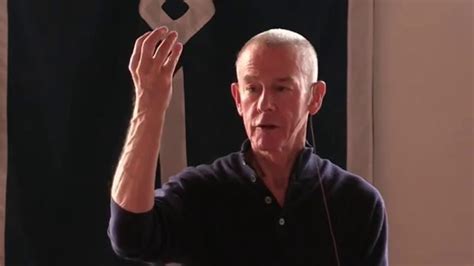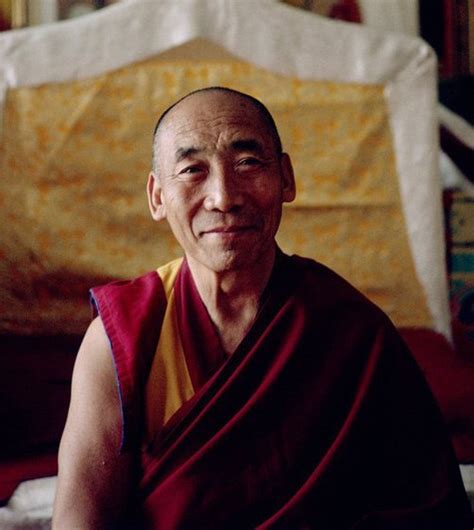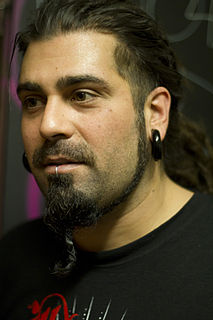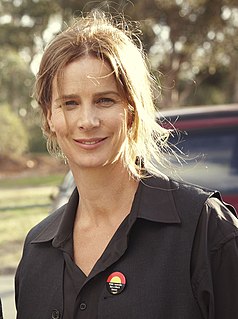Top 810 Buddhist Monk Quotes & Sayings - Page 14
Explore popular Buddhist Monk quotes.
Last updated on April 15, 2025.
A wise man once told me- he’s a muslim by the way- that he has more in common with a jew than he does a fanatic of his own religion. He has more in common with a rational, reasonable-minded Christian or a Buddhist or Hindu than he does with a fanatic of his own religion. In fact, he has more in common with a ration, reasonable-minded atheist than he does with a fanatic of his own religion
From a Buddhist point of view, the actual experience of death is very important. Although how or where we will be reborn is generally dependent on karmic forces, our state of mind at the time of death can influence the quality of our next rebirth. So at the moment of death, in spite of the great variety of karmas we have accumulated, if we make a special effort to generate a virtuous state of mind, we may strengthen and activate a virtuous karma, and so bring about a happy rebirth.
There is more than one way to burn a book. And the world is full of people running about with lit matches. Every minority, be it Baptist/Unitarian, Irish/Italian/Octogenarian/Zen Buddhist, Zionist/Seventh-day Adventist, Women's Lib/Republican, Mattachine/FourSquareGospel feels it has the will, the right, the duty to douse the kerosene, light the fuse. Every dimwit editor who sees himself as the source of all dreary blanc-mange plain porridge unleavened literature, licks his guillotine and eyes the neck of any author who dares to speak above a whisper or write above a nursery rhyme.
I think it would help if, when people are first ordained, they underwent a period of strict training, maybe for several years. During this time they would learn basic Buddhist philosophy in a monastic community where all the teaching and training was directed toward living a perfect monastic life and wasn't channeled out to fit into the lay life - which is what usually happens in Dharma centers where the teachings are directed toward how to live the Dharma in your everyday life.
Whether you believe in God or not does not matter so much, whether you believe in Buddha or not does not matter so much; as a Buddhist, whether you believe in reincarnation or not does not matter so much. You must lead a good life. And a good life does not mean just good food, good clothes, good shelter. These are not sufficient. A good motivation is what is needed: compassion, without dogmatism, without complicated philosophy; just understanding that others are human brothers and sisters and respecting their rights and human dignity.
One day Mara, the Buddhist god of ignorance and evil, was traveling through the villages of India with his attendants. He saw a man doing walking meditation whose face was lit up in wonder. The man had just discovered something on the ground in front of him. Mara's attendants asked what that was and Mara replied, "A piece of truth." "Doesn't this bother you when someone finds a piece of the truth, O evil one?" his attendants asked. "No," Mara replied. "Right after this they usually make a belief out of it."
Finally, I would like to assure my many Buddhist, Christian, Hindu, Jewish, and Muslim friends that I am sincerely happy that the religion which Chance has given you has contributed to your peace of mind (and often, as Western medical science now reluctantly admits, to your physical well-being). Perhaps it is better to be un-sane and happy, than sane and un-happy. But it is the best of all to be sane and happy. Whether our descendants can achieve that goal will be the greatest challenge of the future. Indeed, it may well decide whether we have any future.
Dharma is not about credentials. It's not about how many practices you've done, or how peaceful you can make your mind. It's not about being in a community where you feel safe or enjoying the cachet of being a 'Buddhist.' It's not even about accumulating teachings, empowerments, or 'spiritual accomplishments.' It's about how naked you're willing to be with your own life, and how much you're willing to let go of your masks and your armor and live as a completely exposed, undefended, and open human person.
The Bible represents a fundamental guidepost for millions of people on the planet, in much the same way the Koran, Torah, and Pali Canon offer guidance to people of other religions. If you and I could dig up documentation that contradicted the holy stories of Islamic belief, Judaic belief, Buddhist belief, pagan belief, should we do that? Should we wave a flag and tell the Buddhists that the Buddha did not come from a lotus blossom? Or that Jesus was not born of a literal virgin birth? Those who truly understand their faiths understand the stories are metaphorical.
Karma is the record of services. Karma is the term used in Buddhist teaching. Taoists use the term te. Christians us the term "deed." Many other spiritual beings use the term "virtue." Karma, te, deed, and virtue are the same thing but in different words. To understand karma is to understand all of these words.
You can keep your own religion - Buddhism, Islam, Hinduism, Mormonism - you just need to add Jesus to the equation. Then you become complete. You become a Buddhist with Jesus, a Hindu with Jesus, a Muslim with Jesus and so on. You can throw out the term Christianity and still be a follower of Jesus. In fact, you can throw out the term Christian too. In some countries, you could be persecuted for calling yourself a Christian, and there is no need for that. Just ask Jesus into your heart, you don't have to identify yourself as a Christian.
The Rolling Stones were an inkling towards an appreciation of the unity of music, dance and words. Any of the black R&B people who had a stage show that involved dancing, music and words did the same thing, except that I thought Jagger's words were good, his music was good and his dancing was good. I spoke to him about Blake and tried to get him to sing [William] Blake's The Grey Monk, to use his words as lyrics. He didn't do it. In the end, I did it myself.
The perfection of joyful determination is defined as taking delight or feeling joy in doing something positive or virtuous. If you are very joyful about doing negative things or about being busy with meaningless activities, this is not called joyful exertion from a Buddhist point of view. This kind of attitude is actually a form of laziness, an attachment to frivolous activities. Such a person would not be considered diligent at all. But if you are JOYFUL and DETERMINED TO PERFORM POSITIVE ACTIONS, then as a result, you discover and learn many new things that you didn't know about before.
Not Christian or Jew or Muslim, not Hindu, Buddhist, sufi, or zen. Not any religion or cultural system. I am not from the East or the West, not out of the ocean or up from the ground, not natural or ethereal, not composed of elements at all. I do not exist, am not an entity in this world or the next, did not descend from Adam or Eve or any origin story. My place is placeless, a trace of the traceless. Neither body or soul. I belong to the beloved, have seen the two worlds as one and that one call to and know, first, last, outer, inner, only that breath breathing human being.
In Buddhist ideology, the conventional self is that which is constructed in a way by the use of the pronoun, and when you realize there is no absolute ego there, no disconnected one, self, or ego, then that actually strengthens your conventional ego. It does so in the sense that then you realize it's a construction, and you can strengthen it in order to help others, or do whatever you're trying to do, it's not like you no longer know who you are. Then you can organize your behavior by using your ego, as it's now the pronoun.
Many poets are not poets for the same reason that many religious men are not saints: they never succeed in being themselves. They never get around to being the particular poet or the particular monk they are intended to be by God. They never become the man or the artist who is called for by all the circumstances of their individual lives. They waste their years in vain efforts to be some other poet, some other saint...They wear out their minds and bodies in a hopeless endeavor to have somebody else's experiences or write somebody else's poems.
I love jazz. So to me, there are two main types of jazz. There's dancing jazz, and then there's listening jazz. Listening jazz is like Thelonius Monk or John Coltrane, where it's a listening experience. So that's what I like; I like to make stuff that you listen to. It's not really meant to get you up; it's meant to get your mind focused. That's why you sit and listen to jazz. You dance to big band or whatever, but for the most part, you sit and listen to jazz. I think it comes from that aesthetic, trying to take that jazz listening experience and put it on hip-hop.
Although I'm not Christian, I was raised Christian. I'm an atheist, with a slight Buddhist leaning. I've got a very strong sense of morality - it's just a different morality than the loud voices of the Christian morality.... I can't tell you how many films I've turned down because there was an absence of morality. And I don't mean that from any sort of Judeo-Christian-Muslim point of view. I'm not saying they're wrong and can't be made. But, fundamentally, I'm such a humanist that I can't bear to make films that make us feel humanity is more dark than it is light.
But the solution to the riddle of life and space and time lies outside space and time. For, as it should be abundantly clear by now, nothing inside a frame can state, or even ask, anything about that frame. The solution, then, is not the finding of an answer to the riddle of existence, but the realization that there is no riddle. This is the essence of the beautiful, almost Zen Buddhist closing sentences of the Tracticus: "For an answer which cannot be expressed the question too cannot be expressed. The riddle does not exist."
Human beings by nature want happiness and do not want suffering. With that
feeling everyone tries to achieve happiness and tries to get rid of suffering, and everyone has the basic right to do this. In this way, all here are the same, whether rich or poor, educated or uneducated, Easterner or Westerner, believer or non-believer, and within believers whether Buddhist, Christian, Jewish, Muslim, and so on. Basically, from the viewpoint of real human value we are all the same.
The life of a chess master is much more difficult than that of an artist - much more depressing. An artist knows that someday there'll be recognition and monetary reward, but for the chess master there is little public recognition and absolutely no hope of supporting himself by his endeavors. If Bobby Fischer came to me for advice, I certainly would not discourage him - as if anyone could - but I would try to make it positively clear that he will never have any money from chess, live a monk-like existence and know more rejection than any artist ever has, struggling to be known and accepted.
The question has often been asked; Is Buddhism a religion or a philosophy? It does not matter what you call it. Buddhism remains what it is whatever label you may put on it. The label is immaterial. Even the label 'Buddhism' which we give to the teachings of the Buddha is of little importance. The name one gives is inessential.... In the same way Truth needs no label: it is neither Buddhist, Christian, Hindu nor Moslem. It is not the monopoly of anybody. Sectarian labels are a hindrance to the independent understanding of Truth, and they produce harmful prejudices in men's minds.
I think there's some pretty amazing language in the Bible. The thing that's always been interesting to me about religion is that compared to the more modern spirituality, the West Coast pseudo-Buddhist thing that people go for these days, actual Buddhism and Islam have been looking at these philosophical questions, at really hard questions, for a long time. There's a lot of stuff that philosophy doesn't talk about, and in the secular world, a lot of times, people don't talk about these ideas, and that was always really interesting for me.
You can call it tathata, suchness. 'Suchness' is a Buddhist way of expressing that there is something in you which always remains in its intrinsic nature, never changing. It always remains in its selfsame essence, eternally so. That is your real nature. That which changes is not you, that is mind. That which does not change in you is buddha-mind. You can call it no-mind, you can call it samadhi, satori. It depends upon you; you can give it whatsoever name you want. You can call it christ-consciousness.
How does one stay mindful? Where feelings are known as they arise, known as they persist, known as they pass away. Thoughts are known as they arise, known as they persist, known as they pass away. Perceptions are known they arise, known as they persist, known as they pass away. This is how a monk stays awake.
A person without an Apple watch is perfectly content with his present watch but when he sees his friends buying the watch, he will hanker for an Apple watch. The endless cycle of wanting, getting, and wanting again is part of the plot of Capitalism. It is the way Capitalism creates jobs. The only antidote is Buddhism that holds that people might be happier by renouncing desire rather than by striving to satisfy desire. But then how can the economy create enough jobs in a Buddhist society of "less is more."
Although you can find certain differences among the Buddhist philosophical schools about how the universe came into being, the basic common question addressed is how the two fundamental principles-external matter and internal mind or consciousness-although distinct, affect one another. External causes and conditions are responsible for certain of our experiences of happiness and suffering. Yet we find that it is principally our own feelings, our thoughts and our emotions, that really determine whether we are going to suffer or be happy.
I think what happens in a religious life is that we have those experiences of affirmation and that one starts to live a Christian life or a Jewish life or a Muslim life or a Buddhist life, by affirming that affirmation each day. Each day you say 'Yes' to that Yes. So the life of being a Christian for example, is always a life of double affirmation, that you each day say 'Yes' to those counter-experiences of saying 'Yes', even when you're not experiencing them at that time, you're remaining loyal to that experience.
I'm working at trying to be a Christian and that's serious business. It's like trying to be a good Jew, a good Muslim, a good Buddhist, a good Shintoist, a good Zoroastrian, a good friend, a good lover, a good mother, a good buddy?it's serious business. It's not something where you think, Oh, I've got it done. I did it all day, hotdiggety. The truth is, all day long you try to do it, try to be it, and then in the evening if you're honest and have a little courage you look at yourself and say, Hmm. I only blew it eighty-six times. Not bad.


























